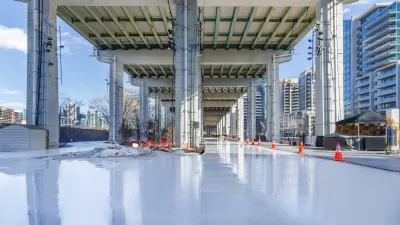Angie Schmitt reports on the results of a new study tying low-income neighborhoods to much higher rates of pedestrian, cyclist, and motorist injuries.
The study, published recently in the American Journal of Public Health, tracked the rates of injury for pedestrians, cyclists, and motorists in Montreal over a five-year period. As Schmitt notes, "They found pedestrians living in low-income neighborhoods were more than six times more likely to be injured by a moving vehicle than those from high-income neighborhoods." Injury rates for motorists and cyclists in such areas were higher as well, with each around four times as likely to be injured as those in high-income neighborhoods.
"The reason, researchers said, was 'exposure to traffic.' The study found that low-income neighborhoods were more likely to contain major arterials and four-way intersections - two of the biggest risk factors for those traveling by any mode. The study also found low-income neighborhoods were subject to traffic volumes 2.4 times greater than high-income - one of the best predictors of injury."
FULL STORY: Study: Low-Income Neighborhoods Much More Likely to Have Dangerous Roads

Maui's Vacation Rental Debate Turns Ugly
Verbal attacks, misinformation campaigns and fistfights plague a high-stakes debate to convert thousands of vacation rentals into long-term housing.

Planetizen Federal Action Tracker
A weekly monitor of how Trump’s orders and actions are impacting planners and planning in America.

In Urban Planning, AI Prompting Could be the New Design Thinking
Creativity has long been key to great urban design. What if we see AI as our new creative partner?

How Trump's HUD Budget Proposal Would Harm Homelessness Response
Experts say the change to the HUD budget would make it more difficult to identify people who are homeless and connect them with services, and to prevent homelessness.

The Vast Potential of the Right-of-Way
One writer argues that the space between two building faces is the most important element of the built environment.

Florida Seniors Face Rising Homelessness Risk
High housing costs are pushing more seniors, many of them on a fixed income, into homelessness.
Urban Design for Planners 1: Software Tools
This six-course series explores essential urban design concepts using open source software and equips planners with the tools they need to participate fully in the urban design process.
Planning for Universal Design
Learn the tools for implementing Universal Design in planning regulations.
Gallatin County Department of Planning & Community Development
Heyer Gruel & Associates PA
JM Goldson LLC
City of Camden Redevelopment Agency
City of Astoria
Transportation Research & Education Center (TREC) at Portland State University
Jefferson Parish Government
Camden Redevelopment Agency
City of Claremont





























